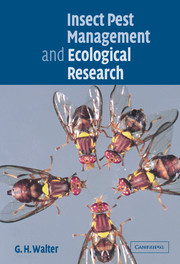Book contents
- Frontmatter
- Contents
- Preface
- Acknowledgements
- 1 Introduction
- Part 1 The place and nature of insect ecology research for IPM
- Part 2 Specific directions in insect ecology research for IPM
- Part 3 Synopsis: Ecological research for IPM today
- 10 Synopsis, practical implications, and modern society
- References
- Index
10 - Synopsis, practical implications, and modern society
Published online by Cambridge University Press: 22 August 2009
- Frontmatter
- Contents
- Preface
- Acknowledgements
- 1 Introduction
- Part 1 The place and nature of insect ecology research for IPM
- Part 2 Specific directions in insect ecology research for IPM
- Part 3 Synopsis: Ecological research for IPM today
- 10 Synopsis, practical implications, and modern society
- References
- Index
Summary
The twentieth century's only claim to have benefited humanity rested on the enormous triumphs of a material progress based on science and technology. Paradoxically, this era ended in a rejection of these by substantial bodies of public opinion and people claiming to be thinkers in the West.
e. hobsbawm (1994, redraft of original statement, p. 11)Introduction
In this chapter the major conclusions from the preceding chapters are linked, to illustrate the advantages of a generalist approach to the interaction between insect ecology and pest management. In general, a much narrower view tends to be prosecuted today, often indirectly through research programmes being artificially constrained by short-term productivity demands and bureaucratic impositions on the one hand, and technocratic leanings in researchers on the other. Two themes especially relevant to the future of insect ecology research for pest management purposes are developed from this synopsis.
The first theme is developed to support the proposition that effective pest management is going to rely on the appropriate use of strong scientific principles. Unfortunately we live in times when the advantages of logic and scientific principles are being sacrificed, with the ‘shift from the modernist culture that reified the liberating power of science to a culture of so-called post-modernism – a post 1960's culture that has shrugged off the emancipatory certainties of science and erected commercial marketplace values and pluralistic images in its stead’ (Hill & Turpin, 1994).
- Type
- Chapter
- Information
- Insect Pest Management and Ecological Research , pp. 273 - 294Publisher: Cambridge University PressPrint publication year: 2003



